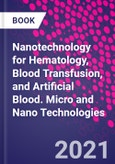Nanotechnology for Hematology, Blood Transfusion, and Artificial Blood outlines the fundamental design concepts and emerging applications of nanotechnology in hematology, blood transfusion and artificial blood. This book is an important reference source for materials scientists, engineers and biomedical scientists who are looking to increase their understanding of how nanotechnology can lead to more efficient blood treatments. Sections focus on how nanotechnology could offer new routes to address challenging and pressing issues facing rare blood diseases and disorders and how nanomaterials can be used as artificial cell-like systems (compartmentalized biomimetic nanocontainers), which are especially useful in drug delivery.
For artificial blood, the nanotechnological approach can fabricate artificial red blood cells, platelet substitutes, and white blood cell substitutes with their inherent enzyme and other supportive systems. In addition, nanomaterials can promote blood vessel growth and reserve red blood cells at a positive temperature.
Please Note: This is an On Demand product, delivery may take up to 11 working days after payment has been received.
Table of Contents
PART 1: FUNDAMENTALS
1. Blood-nano interface: an introduction
2. Blood- nanomaterials interactions
3. Immune system
nanomaterials interactions
4. Uptake by reticuloendothelial system (RES) of the injected nanoparticles
5. Biomimetic nanomedicine: an introduction
6. Transport of nanoparticles in blood flow: Mathematical simulation
7. Effect of nanoparticle on the blood coagulation system (Nanoparticle interface with the blood coagulation system)
8. Toxicity/risk assessment of nanomaterials when used in hematology, blood transfusion and artificial blood
PART 2: HEMATOLOGY
9. Lab-on-a-chip (Lab-on-a-phone) for analysis of blood (diagnosis of blood diseases)
10. Nanotechnology for blood test to predict the blood diseases or blood disorders
11.�Nanopharmacology�in translational hematology and oncology (Nanotechnology applications in hematological malignancies)
12. Target-specific ligands loaded nanomagnets�for� blood�purification (removal of pathogens without fouling of filter membranes)
13. Nanomaterials- based circulating artificial bioreactor for replacement of blood components
14. Drug delivery systems based on blood cells
PART 3: BLOOD TRANSFUSION
15. Smart blood transfusion: An introduction
16. Nanofiltration
17. Nanotechnology for the preservation of red blood cells
18. Nanotechnology for destroying blood clots
PART 4: ARTIFICIAL BLOOD
19. Artificial red blood cells
20. Platelet substitutes
21. WBC substitutes
22. Future scope








